| (insert your NIE or newspaper logo here) |
Weekly Online LessonOnline Lesson ArchiveGrade Level: 8-12
|
Genetically Modified Crops: Boon or Bane?
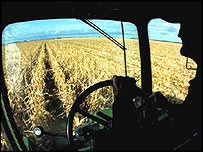 Early last week, proponents of genetically modified (GM) food crops suffered two steps backward in getting their products accepted as part of the mainstream market.
Early last week, proponents of genetically modified (GM) food crops suffered two steps backward in getting their products accepted as part of the mainstream market.
Manipulating crop strains certainly isn't a new concept in growing food. For thousands of years, farmers have used selective breeding to improve the qualities and quantities of their crops.
In the late 1990s, GM technology sparked a revolution in modern commercial agriculture. Now, selecting for desired characteristics is more precise and often integrates genetic material from different species.
Proponents argue that GM crops (which include strains of wheat, corn, soybeans, and tomatoes) resist pests better, survive herbicide application, enhance human health, and yield more food per acre than their conventional, non-GM cousins. Today, about half of America's acres of soybeans and cotton, and about one-third of our corn, have been genetically engineered.
But on Monday, May 10, 2004, a study published in the Proceedings of the National Academy of Sciences warned that GM corn, also called "maize," likely makes the pest problem worse.
Scientists studied maize modified by incorporating genes from a bacterium, called Bacillus thuringiensis (Bt), which makes the corn plant toxic to major pests, including the European corn borer. The advantage is that these fields need only one spray of pesticide compared to the multiple sprays conventional fields need. The downside is that natural genetic mutations in the pests can lead to Bt-resistant offspring.
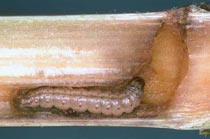 Developers and farmers of Bt maize have tried to prevent the success of resistant offspring by surrounding the GM crops with conventional, non-modified strains. That way, if Bt-resistant pests emerge, they would likely breed with the non-resistant mates nearby.
Developers and farmers of Bt maize have tried to prevent the success of resistant offspring by surrounding the GM crops with conventional, non-modified strains. That way, if Bt-resistant pests emerge, they would likely breed with the non-resistant mates nearby.
Unfortunately, the recent study shows that the Bt maize has been cross-pollinating with the non-GM fields, undercutting that strategy.
The second step backward for GM proponents came on Tuesday, when American bio-technology giant Monsanto announced it was withdrawing its plan to sell its GM wheat strain to world markets. It would have been the world's first commercial biotech wheat.
Monsanto has already launched GM versions of corn and soybeans into mainstream agriculture, but experts believe the company's move away from wheat was prompted by fierce opposition from the conventional grain industry and sectors of the general public. These opposing groups are generally concerned with who can own and grow GM crops, as well as the unknown long-term effects on the environment and human health.
Such debates over the pros and cons of GM agriculture will only continue to grow, as populations rise, water gets scarcer, and pests become tougher to manage. So this week you're going to learn more about what's in your food, how it got there, and what future harvests may deliver to your dinner table. Plus, you'll explore the depths of the debate that revolves around this revolutionary farming practice.
Selective Science
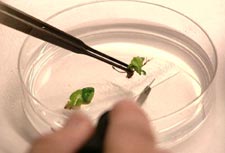 First, let's get a grasp of traditional crop selection and GM crop development.
First, let's get a grasp of traditional crop selection and GM crop development.
Visit the PBS site, Harvest of Fear, and Engineer a crop. Read the introduction, then open the Selective Breeding interactive. (Shockwave/Flash required; if you get a message saying "This application requires an Xtra...," click OK and continue.)
Follow the instructions and select the largest ear of corn each season. This would produce the highest possible yield per acre.
Return to the Engineer a Crop page, and try your hand at Transgenic Manipulation. In what ways is this different from selective breeding, for the plants and for the people involved?
Now find out, What's for dinner? After reading the introduction, open the Guess What's Coming to Dinner? interactive. What are some of the changes scientists are working on and why? Do you think these would be worthwhile and valuable improvements to our conventional food sources?
Before leaving this site, watch the video, What about Fish? Do you think the benefits of GM salmon in open water pens are worth the risks? Why or why not?
Food Fight!
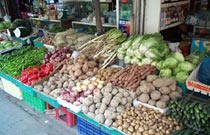 Public debate over the engineering, growing, and selling of GM food crops is a worldwide affair. Like other fundamental issues, our food choices -- which affect ecosystems and human health -- are shaped not only by science, but also by public opinion and economics.
Public debate over the engineering, growing, and selling of GM food crops is a worldwide affair. Like other fundamental issues, our food choices -- which affect ecosystems and human health -- are shaped not only by science, but also by public opinion and economics.
To start understanding what exactly is at issue regarding GM foods, let's hop over to the UK and take a look at GM Nation? The public debate. Although this particular debate is rooted overseas, it's very similar to the debate happening within the United States.
Begin with Where Do I Start? Read The question, along with the Views for and the Views against. Use the left-hand menu -- the Debating Zone -- to move through each question in this section.
Make sure to find out the answers to all the questions, including When did GM start?, What crops are already GM?, and Do we eat GM food unknowingly? What proportion of the world's GM crops is grown in the U.S.? Do you think GM products should be clearly labeled?
Now explore the next section, Why GM?, in a similar fashion. So, Who's driving GM technology? Who really benefits? Will GM benefit the world? What about non-food crops?
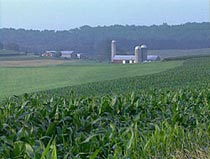 Continue through this site, exploring the remaining sections:
Continue through this site, exploring the remaining sections:
Also, read The findings, which summarizes the public opinion on GM crop development.
What role does science play in shaping agricultural research and development, public opinion, and government policies? What roles do governments and biotech companies play? Do choices by consumers affect the issue?
Now that you've fully explored this issue's arguments, what do you think about GM food? Which points do you think are the most significant and persuasive, and why? Do your friends share your viewpoint? If not, how do their opinions about what's most important differ from your own? Who do you think should be in charge of managing GM technology?
If you'd like to look into this topic even more in-depth, check out the Cornell's University website, Genetically Engineered Organisms: Public Issues Education Project. Here, you'll learn even more about GM (also called "Genetically Engineered," or GE) foods In the Market and U.S. Regulation of them.
Newspaper Activities
Browse issues of Targetnewspaper and look for articles about crops, food, companies, or government policies related to GM technology. Does the news move GM development forward or is it another obstacle for that industry? How are farmers reacting? How is the general public reacting? How does the news affect the GM debate in the U.S. and abroad?
© Copyright 2004
Learners
Online,
Inc.
